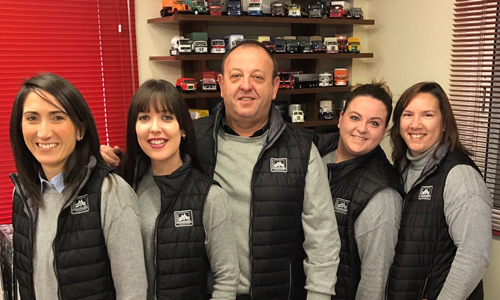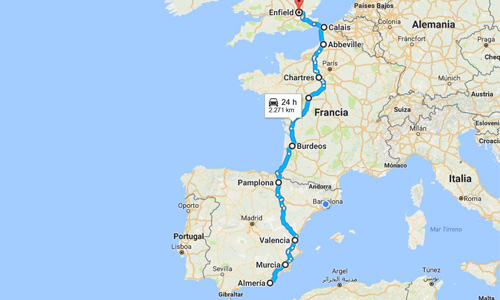We got to see in first person what it takes to carry a vegetables freight from Spain to England in a refrigerated transport.
Almería, in the Spanish south-eastern region of Andalusia, has gained the nickname of «Europe’s orchard» due to its intensive agricultural activity. An impressive number of companies have specialized in the transportation of perishable goods under controlled temperature vehicles. Only in Wtransnet’s Associates Searcher we have encountered around 200 companies from Almería and its surroundings. These companies carry out refrigerated transport in any of categories (temperature controlled, meat hooks temperature controlled vehicles, thermograph fridge, double deck or curtained sided).
Today we travel there, to understand what it takes for a company to work in this environment. According FEPEX’s dates (Spanish Federation of Producers Associations Exporting Fruits, Vegetables, Flowers and alive Plants) Spanish fruit and vegetable exportation raised up €11.9 million in 2015. These numbers mean that now Spain has risen as the most important European destination market. Germany, France and United Kingdom come on top as the main Spanish fruits and vegetables importing countries.
How to carry out such a transport
Once there, we get to of the Masher Group’s traffic department. They are located in Cuevas de Almanzora (Almería). It’s friday, at noon. One of their regular customers calls to confirm a load that will depart from Masher Group’s headquarters, reaching England. He asks for common questions, such as the warehouses where the load has to be carried out and the pallets temperature. Starting from now, the action protocol gets ongoing to let the truck leave the same night.
The first thing to do is to assign a driver to a truck. The client gets all the vital informations, including those regarding the driving plate. They will then be informed in order to prepare himself for the route.
The load order specifies the good collection points, which is made up of 26 pallets for a total of 20.000 kg of tomatoes, cucumbers, peppers and aubergines. Using a thermometer, the driver in charge has to control the load’s temperature. The client has to tell the correct temperature rank.
It’s then time to load the truck. The temperature is registered in a document and is kept under control, using a thermograph during the entire journey. The driver is responsible for any variation and he has to record them in the record sheet.
When the truck is fully loaded and ready to leave, the driver will also check all the security systems. Assured that they are all properly working, he can start the route.
A GPS system is used by Masher Group to control the transport with the highest possible guarantees. This system is able to locate the truck in real time, can control the driving hours and the load temperature at any time. The driver can see all these informations from a tablet install in the truck. If there are any kind of problems with the temperature, an alert is given. The driver can then intervene and resolve the issue.
Migratory conflict in Calais
Route planning involves the traffic department. It might look easy at first, but everything has to be taken into account. All driving periods must be covered by the law. All the restrictions has to be taken in consideration, as well as the hours of driving and the mandatory breaks and resting times. The truck will reach England through the Eurotunnel, under the Calais-Folkestone route.
“Almost all haulers that carry out this route know that Rouen is the last safe stop before arriving to the Eurotunnel. This is the starting point where the migratory conflict is becoming a problem. It was usual that clandestines tried to infiltrate themselves in trailers to reach the United Kingdom», traffic department manager Claudio Osorio says.
Even if the daily conflicts in Calais could be treacherous, Masher Group is keeping their trucks going towards England. The situation has calmed down now. After the media investigations that have occured recently, both France and the United Kingdom have intesifed their police presence and activity there, Claudia says. There is no effective risk, besides training their haulers to prevent the entry of clandestines in the trailers. They carry out an internal protocol where the driver has to manually register all the stops he makes in a sheet. The checking activity has to be made upon arriving at the Eurotunnel train. Once there, he has to voluntarily presents himself to the police controls. These precautions allow both the driver and the goods to safely arrive at destination.
Search of return journeys to reduce empty kilometres.
Alter discharge and appropriate rests, the return journey will start. The truck must be charged again, looking for a Spanish destination. The return load research process starts when the truck leaves Almería: «The traffic department is in charge of finding it trough Wtransnet’s Freight Exchange. In many occasions, return journeys are hired by usual clients, trying to make the loads coincide with the same delivery country. If this is not possible, the company looks for a return load in France or the Netherlands», explains Claudia.
In the end, the truck arrives at the Almería base. After being washed and prepared for the next shipment, everything starts again. In the transport world the curtains are never lowered. There is no fade to black or titles: everything must be kept under control, as the next journey could not be too far away.
 English
English Español
Español Deutsch
Deutsch Français
Français Italiano
Italiano Português
Português Polski
Polski Wtransnet Blog Wtransnet Blog: Transport and Logistics News in Europe.
Wtransnet Blog Wtransnet Blog: Transport and Logistics News in Europe.

